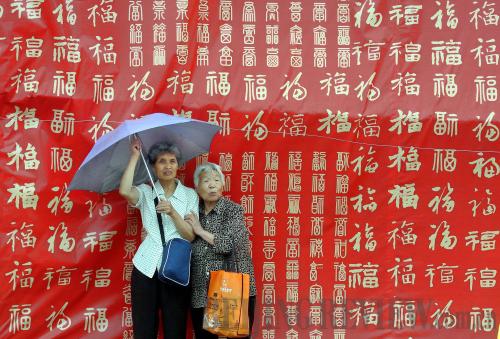|
 |
|
PROVIDING FOR THE OLD: Two seniors from Henan Province stand in front of a wall full of characters of "good fortune." In Henan, there are 11.95 million seniors aged above 60, accounting for 12.72 percent of the provincial population (WANG SONG ) |
"One day, when I'm old, I may not be able to provide for myself...." That's a song Li Jianjun loves best, and every so often he would worry about his pension life whenever he hears the song.
Officials from the Ministry of Human Resources and Social Security (MOHRSS) have repeatedly emphasized that China's pension fund won't run dry, but still Li feels insecure about his future and retirement. Li favors the words of experts.
Zheng Bingwen, Director of the World Social Security Research Center at the Chinese Academy of Social Sciences (CASS), told the media that in 2011, Chinese employees paid 2.5 trillion yuan ($393.7 billion) into their pension accounts, but less than 300 billion yuan ($47.24 billion) was ready for payment.
This is why Li and millions of others worry.
Li, 35, has worked for 11 years at a current monthly pay of 4,000 yuan ($629.92). Each month he pays 8 percent of his average monthly wage from the previous year to his individual pension account. Li's employer also pays 20 percent of his average monthly wage to a social collection fund.
The social collection fund and individual account are the two components of China's pension fund system.
"Now the shortfall in the individual accounts are so enormous, and I'd like to know whether the shortfall can be made up and whether my pension would be affected after my retirement," Li said.
The MOHRSS, however, has denied the shortfall exists. According to the ministry's figures, at the end of 2011 the national pension fund had 1.9 trillion yuan ($299.21 billion) available.
"The endowment insurance fund has more incomes than expenditures, and currently there is no shortfall of the pension fund," said Yin Chengji, spokesman for the MOHRSS.
The "deficit" denied by the MOHRSS means that cash flow of the pension fund system, or withdrawal of pensions faces no problem at the moment. From the incomes and expenditures of the pension fund system, the MOHRSS statement conforms to the actual situation. According to a report released by the National Audit Office on August 2, in 2011 the national pension fund system registered 1.56 trillion yuan ($245.67 billion) in total incomes and 1.14 trillion yuan ($179.53 billion) in total expenditures. The aggregate surplus stood at 1.85 trillion yuan ($291.34 billion) at the end of the year.
The current surplus makes people who withdraw pensions now feel eased, but the shortfall of the national pension fund will not be covered by the current surplus. At present, the number of working people is larger than that of the retired, so the number of people paying the pension fund is larger than that of those withdrawing pensions. Also thanks to the fiscal subsidies, the shortfall is not obvious. Once the employment situation changes, for example, the aging process accelerates or there is serious economic recession, the problem of pension fund shortfall will break out severely.
China currently operates a multiple-track pension system. Pensions of people working for government agencies and public institutions are granted by government funds; employees of urban enterprises are subject to the pension fund system composed of individual accounts and social collected funds; and farmers participate in the new-type social endowment insurance system that was established in 2009. The basic social pension for farmers set by the Central Government is 55 yuan ($8.66) per person per month, and local governments can increase the standard in accordance with local conditions.
At present, the deficit is in the pension fund system for urban employees set up in 1996. At that time, China was deep into the market-oriented reform of state-owned enterprises, allowing for a market-oriented endowment insurance system to be adopted.
At that time, there were more than 30 million retirees from enterprises. Before the establishment of the endowment insurance system, enterprise employees did not need to pay for their endowment insurance. Therefore in the pension fund system, there are no individual accounts for these retirees, and their pensions all come from social collected funds. However, social collected funds are not enough to distribute pensions, so many local governments have to divert funds from individual accounts.
China tried to solve its pension problem by diverting funds from individual accounts, but to little effect. At the end of 2011, only 300 billion yuan in the individual accounts were payable, a shortfall of 2.2 trillion yuan ($349.2 billion) compared with 2.5 trillion yuan ($396.8 billion) paid by employees to their individual accounts. The shortfall hasn't been made up for. Instead, it has been expanding. According to CASS figures, from 2008 to 2010, the shortfall expanded from 1.4 trillion yuan ($220.47 billion) to 1.7 trillion yuan ($267.72 billion), and from 2010 to 2011, the shortfall rose by 500 billion yuan ($78.74 billion).
| 